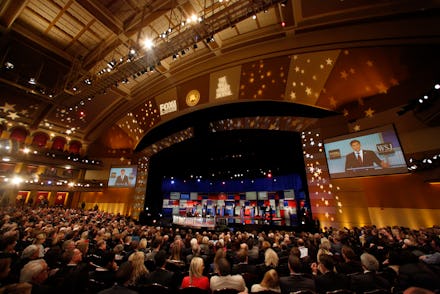"Brokered Convention": What It Is and How It Could Upend the 2016 Presidential Election

If his public appearances are any indication, Donald Trump is feeling as confident as ever. And he has the numbers to back him: A New York Times/CBS News poll released on Thursday showed the Washington, D.C., outsider continuing to dominate the Republican primary campaign at 35%, with Ted Cruz a distant second at 16%. But there's a possibility it won't be that simple for Trump — or any candidate — to clinch the nomination simply by wooing voters.
Instead, the Republican party is preparing for a potential "brokered" or "contested" convention, in the event that no candidate garners the delegate support necessary to win the nomination. With 2,470 delegates, the Republican National Convention requires a simple majority for their presidential pick.
So what happens if there's no clear winner?
As a "neutral" body, the RNC's chief strategist and spokesperson Sean Spicer told the Washington Post it's the job of the committee to ensure the cleanest outcome. "The rules are set until the convention begins next July," Spicer said. "Our goal is to ensure a successful nomination, and that requires us thinking through every scenario, including a contested convention."
If no candidate comes out on top the first time around, the next step is a second — or third or fourth or fifth — vote on the convention floor, as many as it takes for someone to get a majority. Under normal circumstances, delegates must endorse the same candidate they voted for in the primary, but in a brokered convention situation they're free to pick whomever they want, the Washington Post reported.
According to Bloomberg, the last time there was a brokered convention was at the 1952 Democratic National Convention, and it resulted in the totally unexpected nomination of last-minute candidate Adlai Stevenson.
That year also marked the first time conventions were broadcast on television, which could explain the RNC's strict regulation of debates. Among those reforms was the restriction on debates not sanctioned by the GOP. The 2016 campaign will see a total of 11 debates, all GOP-sanctioned, compared to 27 in 2012 before the restriction came into play. In January, RNC chairman Reince Preibus told the Washington Post he believed 2012 debate overkill lost Republicans the presidency by giving candidates too many opportunities to undermine one another. "I'm trying to limit the opportunity we have to kill each other," he said.
Still, that there are still 14 candidates in the race doesn't help.
Despite these logistics, retired neurosurgeon and GOP candidate Ben Carson thinks the idea of a contested convention is an affront to the whole process.
In a statement released on Friday, Carson alluded to the GOP's concern that Trump will run as an Independent. "If this was the beginning of a plan to subvert the will of the voters and replaces it with the will of the political elite, I assure you Donald Trump will not be the only one leaving the party," Carson threatened.
"I'm prepared to lose fair and square ... but I will not sit back and watch a theft," He continued. "My campaign is about 'We the People' not 'They the Powerful.'" As of Thursday, Carson is polling at 13%.
Political wonks are losing their minds over the potential to bear witness to a brokered convention. It's something akin to a unicorn-sighting for people like Bloomberg's Steven Yaccino, who called it "the holy grail of political geekery."
So far there's been very little that can shake Trump's self-assurance, but he acknowledged that a brokered convention could very well be the nail in his campaign coffin. He told the Post, "My disadvantage is that I'd be going up against guys who grew up with each other, who know each other intimately, and I don't know who they are, OK? That's a big disadvantage. ... These kind of guys stay close. They all know each other. They want each other to win."